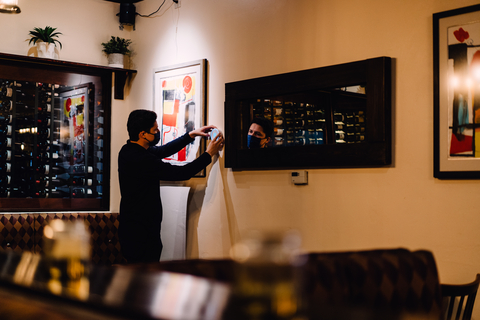
CARMEL-BY-THE-SEA, Calif.– Wynd Technologies, Inc. (Wynd), a maker of AI-powered indoor air monitoring and purification technologies, and Bay Area consulting and engineering company AirByDesign (ABD), announced the successful rollout of their Verified Clean Air program in restaurants in the city of Carmel-by-the-Sea. The groundbreaking certification program enables safer indoor air quality and dining conditions for patrons and workers in an innovative effort to support the local restaurant scene and bring the community together in a post-pandemic world.
The initiative was mobilized as a collaborative endeavor between Wynd, ABD, Carmel Cares and local business leader and philanthropist Bill Hayward. Carmel Cares is a volunteer organization dedicated to keeping Carmel beautiful, safe, and inviting. Led by president and “Chief Caring Officer” Dale Byrne, they have conducted extensive outreach to the city’s business owners to develop an integrated program that efficiently supports the restaurants in this world-renowned seaside destination. Hayward, CEO of the Hayward Healthy Home Initiative, had previously worked to implement Wynd’s air filtration monitoring system at the Post Ranch Inn’s Sierra Mar Restaurant in Big Sur, and enlisted the company’s help again for this initiative — this time with the addition of ABD.
“As a California-based company, we’re immensely proud to have helped improve the overall public safety within a municipality that prioritizes the health of its residents and visitors the way Carmel-by-the-Sea does,” said Dora Du, CMO of Wynd. “Our mission has always been to raise awareness around the importance of indoor air quality in addition to solving for it — and the results of our partnership with AirByDesign and Carmel Cares are a case study for what can be accomplished when businesses and local communities work together.”
To re-build confidence in the safety of indoor dining for patrons, workers and residents, the Verified Clean Air program leverages advanced technologies and techniques pioneered by Wynd and ABD. Starting with an initial assessment by ABD, digital twin models are developed for each restaurant, followed by the design of customized air quality improvement plans. From there, Wynd’s proprietary Halo air quality product suite is installed to actively sense, monitor, and purify each space in real time. Equipped with advanced artificial intelligence models, which can identify pollutants in the air, the Halo can dynamically control HEPA-grade Wynd Max air purifiers to keep the air pristine.
“Carmel-by-the-Sea presented the ideal scenario for our team to collaborate with Wynd — it’s already a world-renowned tourism destination due to its scenic beauty, charm and intimate atmosphere,” said Andrew Limcaco, CEO of ABD. “With more than 50 full-service, locally-owned and -operated restaurants in one-square mile, it has more eateries per capita than any other small city in the country. By scaling the application of this technology to larger cities and metropolitan areas, the implications are amazing for the recovery of the retail and service industries nationwide.”
Restaurants are increasingly signing up for the program, undergoing facility scanning, equipment installation, and staff training on how to educate customers about the system benefits. Blue window decals reading “Verified Clean Air; This business has invested in your health and safety” are displayed to let customers identify participating restaurants that are using the monitoring and purification system. To further facilitate visibility of the program and its mission, Wynd and ABD also provide restaurant owners with customized QR codes on every tabletop, allowing customers to not only view their menus but also see the live air quality reading in the restaurant themselves on the web. Additionally, a grant program has been made available for restaurants that need financial assistance for program participation, covering most of the first-year charges.
“As diners begin to move indoors again, the Verified Clean Air initiative assures locals and visitors to Carmel that our restaurants care about the safety of their staff and customers,” said Byrne. “Our restaurant partners have been instrumental in developing this unique end-to-end solution, and the early adopters are now seeing the benefits of this seamless approach to improving inside air quality.”
Since the program’s launch three months prior, Carmel-by-the-Sea’s participating restaurants have reported immediate improvements not just in air quality, but also guest satisfaction and revenue. This is being complemented by reductions in employee turnover and pandemic-related operational expenses — data collected by Wynd estimates that the cost savings and increased profit from improved air quality add up to more than $17,000 per year on average.

